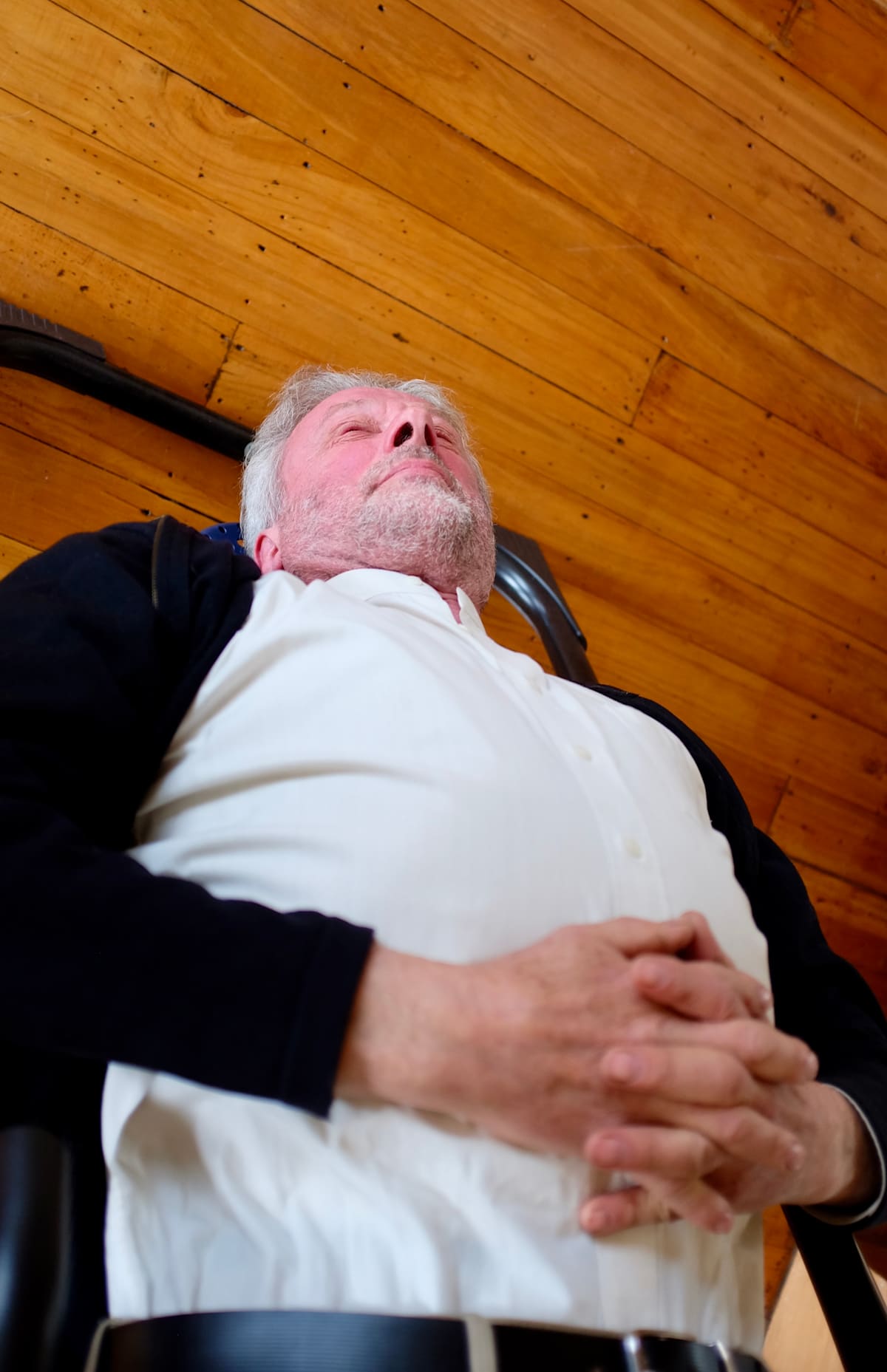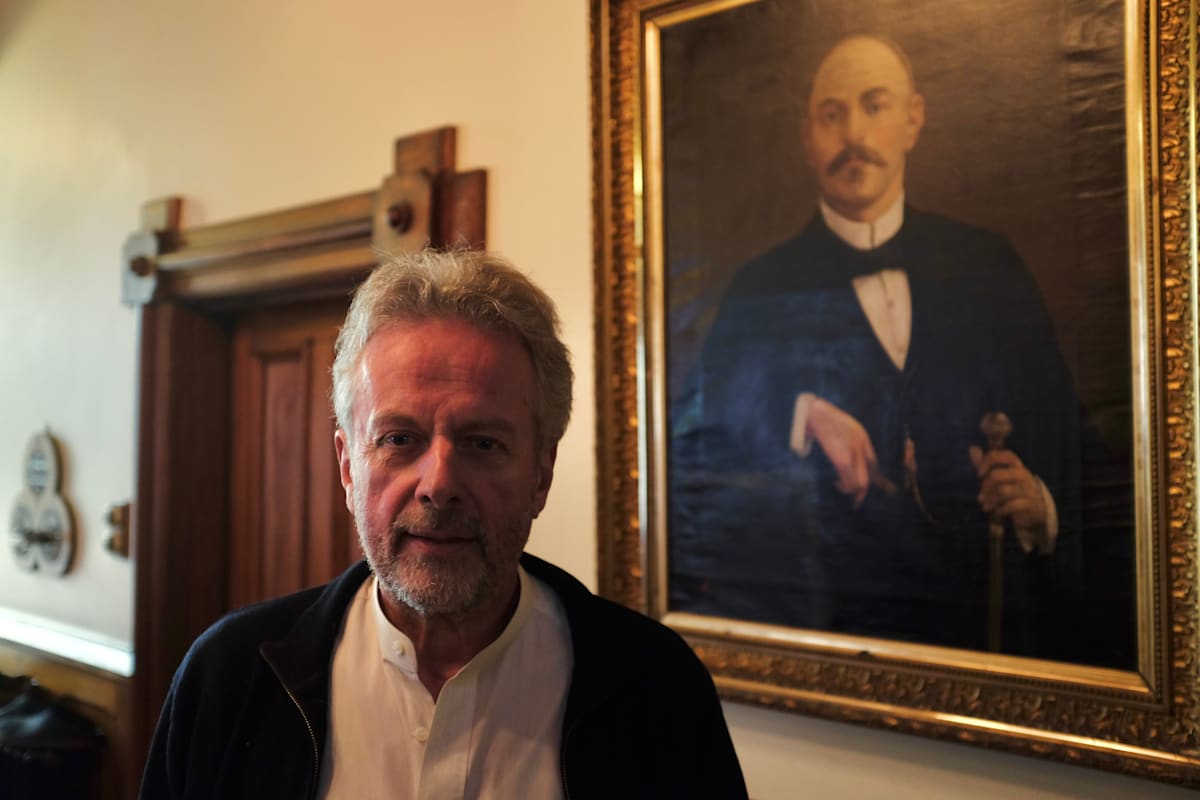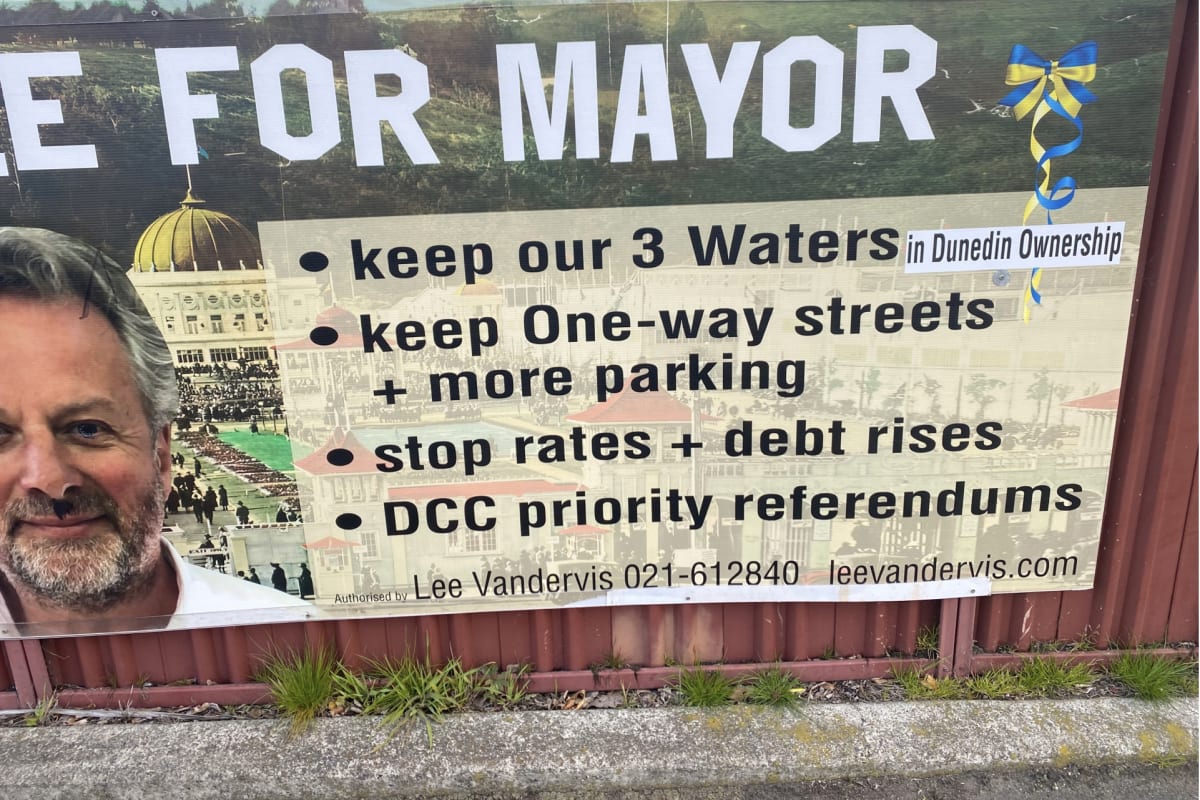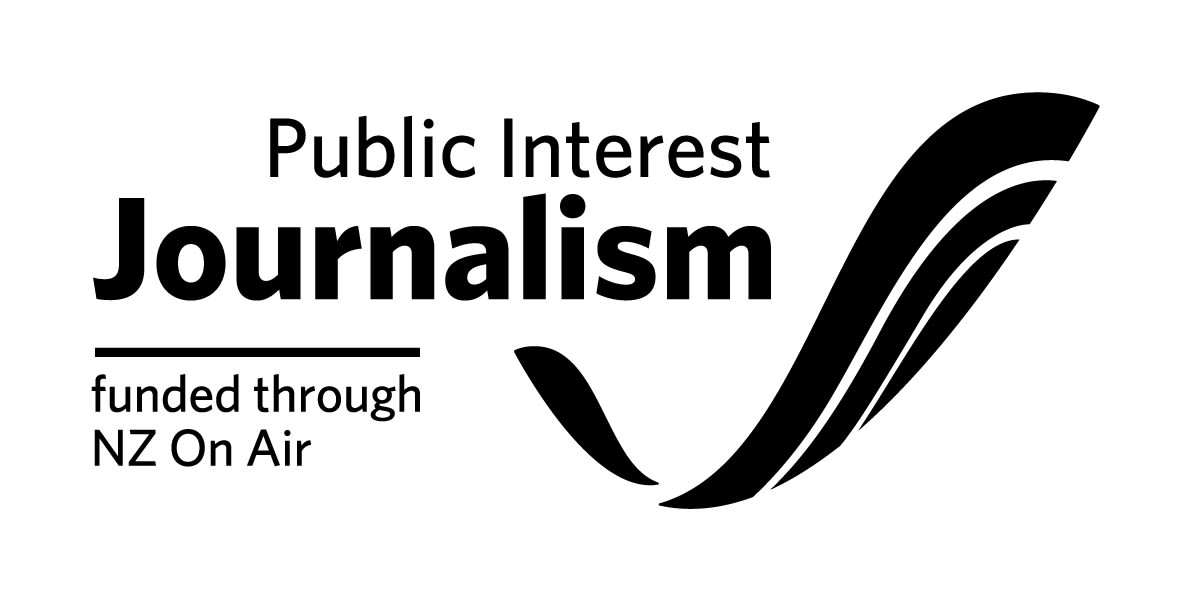
Despite there being 11 contenders, Dunedin’s mayoralty contest looks set to be a two-horse race between candidates who have trouble being in the same room together
In the Green corner is incumbent Aaron Hawkins, a cherubic, witty splasher of cash on cycle paths and a pedestrian-friendly makeover of the main drag, George St. In the staunchly independent corner is long-time councillor Lee Vandervis, a fierce guardian of the public purse for whom the car is king.
Numerically, Hawkins is the narrow favourite in Dunedin's mayoralty race. He beat Vandervis by 2871 votes in 2019 for his first term as mayor.
But that’s just one number: under the proportional single transferable vote (STV) electoral system used by Dunedin, Vandervis was the first choice for mayor of 9481 voters to Hawkins’ 9074. He lost on preferences as the other 12 contenders were eliminated.
In the election for councillors, he polled top with 3534 more votes than second-placed Christine Garey, whom Hawkins made his deputy. It was the same story in 2016: Vandervis ran second to Dave Cull for the mayoralty - Hawkins was fifth - and was the highest-polling councillor.
If the numbers are close, it’s the optics that set the two candidates apart. Barely a week goes by when Vandervis isn’t in the news, typically in a poor light. In contrast, positive press abounds for the mayor.
As recently as September 1, Vandervis offered a mea culpa in an Otago Daily Times story for walking out of a council meeting. He exited rather than apologise, as demanded by Hawkins, for remarks taken to imply former mayor Cull, a latter-day “lycra-clad cyclist”, personally benefitted from a roading project on Otago Peninsula.
The pair had history: Cull, who died last year, in 2017 agreed to pay Vandervis $50,000 - without an apology - to settle a defamation case.
Where Vandervis goes, a headline is sure to follow. At the height of the Covid-19 pandemic, having opted not to be vaccinated, he was trespassed from council premises.
And at the time of publication*, he was awaiting word on whether the Supreme Court would hear a case already ruled against in the High and Appeal courts in which he is arguing the council misused its code of conduct after he disputed a claimed parking infringement. The incident blew up shortly before the last local body elections.
The council could have avoided its reported $100,000 legal bill by accepting it had done wrong, he says. If he wins in court, he will be out of pocket by about $30,000 and will be seeking costs.
The principle at stake, he says, is whether council staff can anonymously “smear” a candidate before an election. “If this passes it will be impossible for any elected representative to criticise staff and to me that’s one of the most important jobs they have to do and most of them don’t do it.”
His lawyer, Len Andersen KC, says they are seeking a Supreme Court hearing on the grounds of reputational harm from the council’s actions.
*Update: On September 16, the Supreme Court denied Vandervis leave to appeal.
Optical illusion
Many of the stoushes Vandervis finds himself in come down to complaints from fellow councillors and council staff about his threatening manner.
Often, though, he draws attention by taking the dissenting view on matters such as painting rainbow pedestrian crossings and funding phallic art installations.
The Otago Daily Times is literally to blame for the bad optics, says Vandervis, who suspects a filter is used to make him appear red-faced in photos. In 2015 he made an unsuccessful Media Council complaint alleging the paper had gone out of its way to print an unflattering photo.

His gripe is undermined, however, by such stories as one a few days before the complained-about photo describing Vandervis’ painstaking restoration of the family home.
Mainstream media be damned - his preferred way to reach supporters is Facebook.
“I know I upset a lot of people by being loud and vocal and perhaps go over the top sometimes. But that’s been necessary for me to make the kind of progress that I have been able to.
“You don’t change things by sitting on council committees. You change them by publicising things that need to be sorted.” He adopted that mantra a decade ago over underspending on stormwater systems.
He cheerfully admits staying up late at night dreaming up attention-grabbing epithets such as “Covid coaches” for the buses Hawkins wants more of and the “lycra-clad” Cull put-down.
In case there is any doubt, he thinks buses and trains have had their day and cars have had a “massive and exalted” surge in popularity to the point that 70-plus percent of journeys are made in them.
“They’re the most efficient, convenient and safe form of urban transport that you could ever hope for.”
Quite the performer
Olivier Jutel, a media lecturer at the University of Otago who tracks the emergence of right-wing populism, says “at a performative political level Vandervis plays the angry man, the ratepayer who’s had a gutsful”.
“That’s always been his shtick - pre-2016 and before the culture wars and populism became ascendant in our politics.”
On his own turf the only intimidation Vandervis projects is through an excess of enthusiasm and competence. Although he broke with his Dutch forebears’ tradition of building for a living, DIY skills are evident throughout his resurrected Roslyn home.
He is personable and open - he evangelises the contraption he uses to tilt himself upside down to take the weight off a worn-out hip - and speaks proudly of his blended family of eight children: two of them doctors, an architect, a lawyer and the youngest, severely autistic 18-year-old Lukas, for whom Vandervis is the carer.
Vandervis, who was brought up in Balclutha, was christened Lieuwe, but ditched the name when he was 20 because it was “too hard”. He became an audio technician after doing a bachelor of arts in philosophy at Otago with maths and science papers.

Vandervis learnt classical violin, cello and piano (and plays a mean dog whistle). But at university, realising being in an orchestra wasn’t doing anything for his love life, he plugged his violin into an amplifier and joined rock band Prometheus.
Prometheus lasted a couple of years, says band member Trevor Reekie, who went on to play in Car Crash Set and Greg Johnson Set and hosts RNZ National’s Worlds of Music.
He says Vandervis is “an exceptionally good musician” and “a good guy”.
“I always enjoy reading about his latest stoush. He’s not as fractious as people make out.”
The Queen’s death is the cue for Vandervis to recall a 1981 brush with royalty. While in the UK for a five-year stint, the firm he worked for installed a sound system at Windsor Castle for a disco marking Prince Andrew’s 21st.
In his tuxedo and cummerbund, he watched the royals prancing around, including Diana Spencer just months before she married Prince Charles. Elton John was also at the party and writes in his memoir, Me, that out of deference to the Queen it was the quietist disco he’d ever been to.
Vogon alert
Vandervis’ readiness to put his domestic life on display is matched by a willingness to parade his contrarian views on life, the universe and everything. He believes all politicians owe it to voters to be as open.
Inspired by Douglas Adams’ Hitchhiker’s Guide to the Galaxy, he produced a 20-page booklet that catalogues the council’s anti-car policies and refutes the bullying accusations against him.

The Green mayor and his Vogons - for the uninitiated, an alien slug-like race bent on Earth’s destruction that in Dunedin comes in the shape of council employees and consultants - are his targets.
He rubbishes Hawkins’ “car phobia” and queries how a public transport policy of bringing “mostly empty big buses” into the city can be good for the environment. As an electric Nissan Leaf driver (with a pair of fossil-fuelled Toyota Land Cruisers also in the driveway) and in the process of taking his home off-grid, he challenges the mayor to see who has more green cred.
“He’s green in theory, I’m green in practice.”
Vandervis is unabashed about his approach of drawing attention to himself to drag issues such as council debt and contracting inadequacies into the daylight. According to numbers he draws from council forecasts, the city is heading for $1 billion of debt this year.
He’s a big believer in data and asserts that a tidal gauge in Port Chalmers that shows just a 1mm sea-level rise a year puts the catastrophising of climate scientists in perspective.
Further, he says although elevated atmospheric carbon dioxide levels are a concern, plants, which rely on CO2 for their growth, aren’t complaining. And such extreme weather events as Pakistan’s calamitous floods and Europe’s recent wildfires are just part of the usual pattern of natural disasters.
“If you study history, these things have always happened.
“Trusting experts is one of the biggest mistakes people can make because the so-called experts are people who are paid to push a certain agenda.”
But the secretary general of the United Nations, António Guterres, would beg to differ: “There is nothing natural about the new scale of these disasters,” he is reported as saying this week in the UK’s Guardian. “They are the price of humanity’s fossil-fuel addiction. This year’s [World Meteorological Organisation] United in Science report shows climate impacts heading into uncharted territory of destruction.”
Vandervis thinks as little of governments as he does of climate scientists.

“I’m of the view that whatever the government says, it’s usually either untrue or said to hide something.”
Other bold calls include him reportedly casting doubt on the official 9/11 explanation and his admiration for Donald Trump.
Although Trump is “a windbag with a massively unconstrained ego”, Vandervis credits him as having done remarkable things as president, namely not starting any wars, getting unemployment down and bringing back to the US industries that had been outsourced to other countries.
The real issues
But all that is by the by. Vandervis says he wants to be mayor to rein in rates increases. As a councillor, he says, he has saved the city “millions”, and as mayor he could save much more.
He says Hawkins, on the other hand, has presided over debt increases of $100 million a year by the city and its commercial operations during his term.
The issues ratepayers should be focusing on are those on his self-funded billboards - they should just be sure they’re reading them right.
Vandervis says some people were wrongly interpreting his No 1 point - “keep our Three Waters” - as support for the “Government/Iwi attempted theft” of Dunedin’s water assets, prompting him to drive around and paste the words “in Dunedin Ownership” on those signs he could access.
If the Government relieves Dunedin of its drinking water, waste-water and stormwater infrastructure, Vandervis says, ratepayers will lose a $3 billion asset that the city could borrow against. And people shouldn’t let themselves be fooled that the assets will remain in public ownership, because the Government could decide to privatise them, he says.

Hawkins’ wish to rearrange the city’s one-way system - also known as State Highway One, which ploughs through the centre of town past the site of Dunedin’s new hospital - with the loss of car parks but to the advantage of pedestrians and cyclists, is another of Vandervis’ hot buttons.
Whether or not Dunedinites give a toss hardly matters, says Otago politics professor Janine Hayward. The key is to engage ratepayers, just 45.6 percent of whom bothered to vote in 2019.
“Perhaps they don’t understand or care about the issues, but the point is anything that reminds people there’s an election on may be a good thing for voter turnout,” Hayward says.
That sounds like a sentiment attention-seeking Vandervis would share, particularly if they cast their votes in his direction.
“I don’t think I’m a naturally inflammatory person but I’ve had to become one. I don’t think I’m naturally thick-skinned, either, but I’ve definitely become one, if only from all the scar tissue.
“But politics has always been an ugly business and you can take it personally or simply recognise it’s the business you’re in. I do what I do for the public who elect me.”
Made with the support of the Public Interest Journalism Fund








